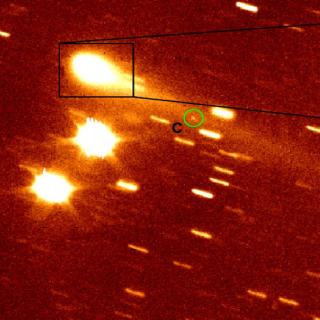Bibcode
Vaduvescu, O.; Curelaru, L.; Birlan, M.; Bocsa, G.; Serbanescu, L.; Tudorica, A.; Berthier, J.
Referencia bibliográfica
Astronomische Nachrichten, Vol.330, Issue 7, p.698
Fecha de publicación:
7
2009
Número de citas
16
Número de citas referidas
15
Descripción
Besides new observations, mining old photographic plates and CCD image
archives represents an opportunity to recover and secure newly
discovered asteroids, also to improve the orbits of Near Earth Asteroids
(NEAs), Potentially Hazardous Asteroids (PHAs) and Virtual Impactors
(VIs). These are the main research aims of the EURONEAR network. As
stated by the IAU, the vast collection of image archives stored
worldwide is still insufficiently explored, and could be mined for known
NEAs and other asteroids appearing occasionally in their fields. This
data mining could be eased using a server to search and classify
findings based on the asteroid class and the discovery date as
``precoveries'' or ``recoveries''. We built PRECOVERY, a public facility
which uses the Virtual Observatory SkyBoT webservice of IMCCE to search
for all known Solar System objects in a given observation. To datamine
an entire archive, PRECOVERY requires the observing log in a standard
format and outputs a database listing the sorted encounters of NEAs,
PHAs, numbered and un-numbered asteroids classified as precoveries or
recoveries based on the daily updated IAU MPC database. As a first
application, we considered an archive including about 13 000
photographic plates exposed between 1930 and 2005 at the Astronomical
Observatory in Bucharest, Romania. Firstly, we updated the database,
homogenizing dates and pointings to a common format using the JD dating
system and J2000 epoch. All the asteroids observed in planned mode were
recovered, proving the accuracy of PRECOVERY. Despite the large field of
the plates imaging mostly 2.27° × 2.27° fields, no NEA or
PHA could be encountered occasionally in the archive due to the small
aperture of the 0.38 m refractor insufficiently to detect objects
fainter than {V ˜ 15}. PRECOVERY can be applied to other archives,
being intended as a public facility offered to the community by the
EURONEAR project. This is the first of a series of papers aimed to
improve orbits of PHAs and NEAs using precovered data derived from
archives of images to be data mined in collaboration with students and
amateurs. In the next paper we will search the CFHT Legacy Survey, while
data mining of other archives is planned for the near future.
Proyectos relacionados

Pequeños Cuerpos del Sistema Solar
Este Proyecto estudia las propiedades físicas y composicionales de los llamados pequeños cuerpos del Sistema Solar, que incluyen asteroides, objetos helados y cometas. Entre los grupos de mayor interés destacan los objetos trans-neptunianos (TNOs), incluyendo los objetos más lejanos detectados hasta la fecha (Extreme-TNOs o ETNOs); los cometas, y
Julia de
León Cruz